By Melissa Doughty
Copyright newsday

Author Joanne Haynes’ lineage is littered with people whose actions caused societal shifts. Taking a deep-dive into that has brought her to an existential truth: disaffection is true wealth.
By that she means not being complacent about one’s place in society and constantly working to reshape and define that.
“Money, property and all of that alone is not wealth. Disaffection is when you need to push against the system, to say it is not enough for me to be a successful black man on the legislative council…,” she said in a recent phone interview with Newsday about her work.
That story is told through a 490-page book she categorises as creative non-fiction.
Haynes takes her reader through her family tree, the history of a growing Trinidad and Tobago and what those personal histories meant to a burgeoning society. She is a seventh generation Philip.
Profiles of Another Rule: A Philip History by a Philip is available through Amazon and select book stores and was published in July.
Its inspiration was derived from a search for her ancestor Samuel Maxwell Philip II.
This led Haynes and her niece, Renee Cushmeer, down a path that illuminated how much personal lives affected the timeline and outcomes of a country. Haynes is no stranger to the literary world and has written four books including Walking published by Macmillan Caribbean Writers.
The blurb reads: “Profiles of Another Rule: A Philip History by a Philip is a revisionist history that traces 400 years of Philip family history. Using Unconventional Spaces of learning to find histories beyond the traditional spaces of textbooks and historical records, Profiles of Another Rule tells lost stories, hidden stories, re-interpreted stories, to establish a Color-In history – that is – a creative, connective, conversational history. This Philip monograph shows how WE Caribbean impacted the world and reminds us of the importance of telling our stories through a people’s interpretation of their self.”
The beginning
The story began with revolution: where Honore Philip I, a white French man, bequeathed property to a black woman and their children, Jeanette Philip.
Jeanette and the children developed that into one of the Caribbean’s wealthiest plantations.
“Whether legally or not, they were a union that lasted for several years and bore all of these children. Jean Baptiste is their grandson,” Haynes said.
Jean-Baptiste Philip went on to become the author of Free Mulatto. Biographical information on the University of Edinburgh’s website said, (He) was a Trinidad-born doctor and the leader of an activist group formed in Trinidad in 1823, which fought against the racist attitudes of colonial authorities through letters and petitions.
“He was a complex figure as he fought against racist attitudes of colonial authorities in Trinidad while also belonging to a black slave-owning family. His famous work Free Mulatto pointed out the racist treatment of free black people in Trinidad, but did not request the abolition of slavery.”
The family tree also gave rise to Trinidadian novelist, lawyer and civil servant Michel Maxwell Philip who went on to become the first black mayor of Port of Spain and the country’s first black solicitor-general.
“His legal prowess was well-documented. He was quite a phenomenal lawyer,” Haynes said.
Even though their histories were documented, Haynes realised that, based on her own experiences and the accounts from relatives, that there was more to be added.
“And in many cases history needed to be corrected and reanalysed,” she added.
“When we started to find all of this history, I recognised, history needed to be added to the way books looked at Honore Phillip I, Jeanette, five of their children and then successive generations all the way up to my mother, Zita Philip.”
Initially, Haynes had titled the book, The Lion’s Roar but through the assistance of the late cultural scholar Prof Gordon Rohlehr decided on Profiles of Another Rule.
In detailing how that developed, Haynes said she’d have long conversations with Rohlehr about her work.
“I really came to a stumbling block and did not want to move on when I recognised that some of my ancestors were owners of enslaved Africans.
“It is one thing to read about it and know it in the back of your mind but when you are actually doing the research and you come face-to-face with it, it daunted me.
“I actually stopped doing the research for about three months.”
She then contacted diplomat Eden Charles, who was always supportive of her writing and liked her radical thinking.
“Eden said, ‘You’re writing something that is not the traditional discourse.’ He said it is not the ‘by-the-book’ kind of conversation about colonisation and African enslavement and so on.”
Eden then suggested she speak with Rohlehr.
In that initial discussion with Rohlehr she confessed she was having difficulty moving on given that some of her ancestors were the “owners” of enslaved people.
“And he said to me something like, ‘You cannot judge yesterday’s history by today’s morality.’ I kinda of did a double take and spilled everything I was feeling about this whole African enslavement thing.
“We ended up talking for more than an hour on the phone.
“I found more and more and I would be in touch with Prof Rohlehr, every so often.”
Rohlehr helped Haynes to come to the idea that themes of rebellion, inheritance, wealth and disaffection were important to the story she told.
“I said, ‘I am looking at the ones who played by a different rule. He (Rohlehr) said, ‘Maybe it is not such a different rule but certainly played by another rule.
“That is the whole thing that brought the title and helped me to assimilate all these ideas that I had and how to position it,” she said.
In doing so, she frontally addressed dualities: black and white, slave and master, owner and owned.
“Along with the story of inheriting African enslavement, I am seeing the inheritance of disaffection. I actually wrote these two angles in the book,” she said.
Tracing her own personal history showed her that some family members were the owners of enslaved people while others were revolutionary, fighting against enslavement.
This led her to conclude at the book’s end, “Finding family is a never ending circle that somehow leads one back to oneself.”
Story of Caribbean people’s resilience
Haynes believes she’s found a treasure trove having a deeper documentation of her family’s history.
African enslavement was the greatest crime against humanity and even though some family members participated in the slave trade, she did not feel the need to justify anything.
“It is what it is and it was what it was and I am healthier for having the inheritance of both sides.”
Haynes hopes this blend of personal history with documented facts gives a more panoramic view of history.
It has even led to a unique theoretical perspective she’s dubbed, Color-In history.
She defined this as, “The colour in history is colouring in those black and white spaces, seeing the nuances, the differences, the dynamics.”
For example, inheritances were something that had not been truly looked at as yet as it related to Jean-Baptiste’s, Free Mulatto. She said Baptiste’s grandfather (Honore) was radical when he wrote a black woman and their children into his will.
Having a panoramic historical view should allow Caribbean people to lose those colonial labels that encourage prejudiced thinking.
Instead, people should be judged by their actions, Haynes said.
It took Haynes nine years to complete the work and throughout that time she received assistance from bodies like the University of Edinburgh, the UK’s Honourable Society of the Middle Temple as well as Grenada’s Genealogical and Historical Society (GGHS).
A 2019 Newsday article titled Remembering History also led Haynes to Ian Forbes, founder of the Scottish Blairs museum and he assisted her with reference material as well.
Though, at times, Haynes and her niece Renee met seemingly insurmountable challenges, they pressed on, knowing that the end result was what mattered.
For example, history recorded Michel Maxwell Philip as illegitimate but they were able to identify his father.
She found his father through Middle Temple and this was where everything started to unravel.
The book was rewritten four times throughout the nine years.
Just before the start of the covid19 pandemic, she got a book deal with a publisher but, during that time, the publisher said they were uncertain as to what was going to happen and so decided not to publish.
“That publisher was absorbed by a bigger publisher after the pandemic. I said I did not want to go through haunting for a publisher again because sometimes it takes years to get a book deal and to get the book actually published. So I self published.”
She hopes the work becomes a part of academic and literary canon, one day.
“One of the takeaways I would hope to come would be a real appreciation of the dynamics that shape us as Caribbean people, the nuances and how we survived and thrived in colonialism.
“We tend to think that violent revolution was the only way of pushing back against the system but the very way in which people existed in their day-to-day living can be seen, when you look at the Phillips as a microcosm, of resistance and way of being here in the Caribbean.”
She used the story of Honore II’s fight with the federal rebellion against chattel slavery as an example of a smaller image within the bigger picture.
“It is the story of Caribbean people’s resilience, the reinvention of us as a people. One minute he is working with his mother as a business partner, next he is on the battlefield with a sword.
“He was executed and that, for me, is one of the richest stories of doing this book and something, I hope, could help people broaden their perspective and see themselves. It shows such a resilience, a creativity in surviving and a dynamism. These are all things we applaud in our Caribbean society.”
She also wants it to remind people to stake their claim in their place.
Some foreign universities contacted her and she did some book talks. She hopes to do more of these as awareness of her work grows.



